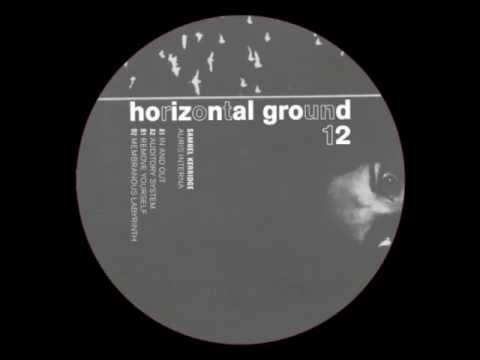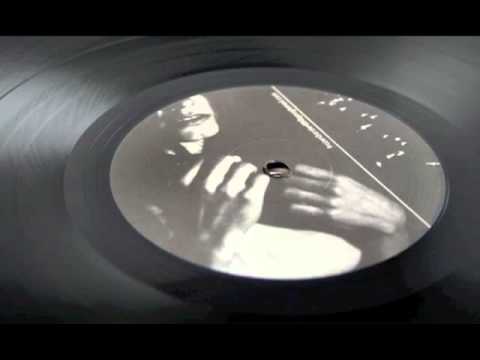Photo by Kate Coffee
Samuel Kerridge may have only released one EP to date, the almost impossibly accomplished Auris Interna on Horizontal Ground, but youʼre about to hear a great deal more from him, beginning with his new Waiting For Love 12", which is about to be released through Regis’ Downwards label. Bleak techno may have been attracting a great deal of press lately, but he’s no bandwagon-jumper. Dripping with distortion, his is a slow and sensuous take on the genre that draws from classic 4/4 music, but also the tectonic drones of Sunn O))), the occult industrial electronics of The Haxan Cloak, and even Pink Floyd, all the while retaining a caustic and noisy edge. Kick drums are frequently squashed into the background, but that never seems to detract from the musicʼs forceful impact – sometimes it even strengthens it.
Kerridge also runs the Contort night in Berlin, which acts as a platform for experimental electronic musicians. (The next event’s line-up is enough to tempt me into booking a flight – Cristian Vogel, Violetshaped, PAN’s Bill Kouligas and more are on the bill). And with a third EP due in spring, a forthcoming album, and gigs in Japan ("which I’m looking forward to, although the flight not so much"), Kerridge has a busy year ahead.
Though his music may be blackened and heavy with dread, he’s modest and effusive when discussing it, speaking to the Quietus about his musical history and the importance of pushing against constraints and conventions.
How did the association with Downwards arise and what does it feel like to be a part of it?
Samuel Kerridge: I met Karl [O’Connor, aka Regis, Downwards boss] at a mutual friendʼs house in Berlin, and then we met at a few parties. We had a laugh, I blagged his email, and sent him some music. The rest is history. I owe him a lot. He’s a great asset to music! Downwards, to me, is everything I stand for. 20 years of innovation, and I’m honoured to be a part of it. I have met a few of the Downwards artists – Karl obviously, Juan Mendez [Silent Servant], the guys from OAKE, and people behind the scenes. Everyone is extremely supportive, and their passion for what they do astonishes me.
‘Membranous Labyrinth’, taken from the Auris Interna EP
I know that your initial immersion into dance music came from the acid house scene of the 90s – and elements of it are certainly audible, particularly in your first EP – but how did you get into production to start with, and how did the movement towards techno come about?
SK: The whole reason I started producing was to overcome the fact I couldn’t find any music that I felt reflected me or where I was at. It was all soulless and uninspiring. I had experimented with sounds from an early age, but my naiveté of thinking tracks had to stick within certain parameters made me believe that what I was doing was nothing more than experimenting, so I didn’t really push things. The years went on and I grew more detached from a large proportion of electronic music, and eventually realised that creating music is an expression, an art, not just making tracks for clubs. I’m making music I want to hear now, and Iʼm grateful that people like it too. I don’t go into tracks with limitations, no matter how weird they get. I try to play most things by keyboard, even bass drums, to change the velocity slightly, adding a subtle change here and there. It’s that human feel – nothing or nobody is perfect. I have always been into techno but my tastes were, and still are, very broad, so what you hear now is just years of all these different elements coming together.
That reminds me of something Regis once said, that he didn’t want to make “club fodder”, he wanted to make “giant slabs of music… forsaking any form of melody or traditional structure.”
SK: Yes, the music I make doesn’t conform to traditional structure, “Giant slabs of music” that people can really get stuck into. Iʼd like to leave a legacy, not a five-minute Beatport chart. I think techno is in a good place; itʼs adapting and taking in lots of different inspirations, which is exciting.
You mention broad tastes, and I get a sense of the slow drones of doom metal/psych, especially in Waiting for Love, and I’m wondering what you listen to outside of electronic music? I imagine bands like Sunn O))). The distortion also reminds me a little of Emptyset, or Ben Frost.
SK: I saw Sunn O))) perform at Sonar 2007, and it blew my mind. I was completely amazed for an hour, just standing open-mouthed trying to comprehend what I was feeling and hearing. I came away from there and it had completely changed my outlook on music. That concert certainly gave me more hope and the drive to push boundaries and do what I feel. Bands like The Clash, Velvet Underground, Pink Floyd, Haxan Cloak, Joy Division, Talking Heads, Coil, Throbbing Gristle all also sit highly on my playlist, and I’ve inherited some great albums from my parents too, which expanded my mind from an early age. As for Emptyset and Ben Frost, Iʼve also had the pleasure of seeing both of these acts live, which probably has influenced my sound in parts. They are both doing their own thing and putting their music out there without constraints, which is something I applaud and respect so much.
Samples from the Waiting For Love EP (Downwards)
I definitely see what you mean about kicking against constraints. For instance, on paper at least, technoʼs fundamentally about the drums, and your tracks submerge the percussion, put it quite low down in the mix. How do you think that relates to the wider narrative of techno?
SK: People ask me if I do this on purpose, and in some tracks, it just sounds better. I’ve been hearing clean kick drums for over 22 years. There is rhythm and structure in there, you just have to listen, and itʼs not as obvious. The rest of the elements of the track take you in. I admit it’s not standard club techno, but it sounds incredible on large systems! Itʼs powerful and intense, and you need to experience it in a club environment. Maybe I try and replicate the power I felt from Sunn O))), aiming not just for an aural experience, but a physically captivating one too. I seem to get a mix of responses at my live shows; people are either transfixed or they start to lose it, but to engage the audience and have their undivided attention for an hour is flattering to say the least.
I want the music to consume you, take you in. I want a reaction from people, for them to be taken aback, all their senses assaulted. I don’t want to deliberately make harrowing music, though I see it as having a lot of emotion and soul. I hope people can express themselves when hearing it, but I also like to have that shock factor. I think techno is like any art form, an expression rather than specifically a genre. All my tracks have a strong narrative, some of which probably stems from listening to early Pink Floyd albums and so on. You take from it what you will and everyone has his or her own ideas about it.
I’d be interested to know more broadly what you think of the greater exposure dark techno has been getting recently.
SK: To put it bluntly, I think people are getting bored of shit music. There are too many sheep. I think the whole world is finally seeing the allure of electronic music, which is great, and for every 10,000 David Guetta fans, at least ten of them will explore new avenues, maybe buy a bass and a distortion pedal, which is of course something we should embrace.
‘Auditory System’, taken from the Auris Interna EP (Horizontal Ground)
Now youʼve moved to Berlin, what kind of impact do you think the new location has had on your sound or on your creative process?
SK: I lived in Manchester before Berlin, which definitely has had an influence on my sound. I like raw industrial cities – they feel good and the people are usually genuine too, and take no bullshit. I suspect I worked in a coalpit in a previous life, and loved it!
Before we left for Berlin my sound was getting there, I just never had the chance to spend time and develop it further. Berlin being a fairly cheap city allowed me more time to concentrate and get a bunch of tracks together, which eventually turned into the Horizontal Ground release [Auris Interna]. Exploring the city, the rawness, the diversity, also helped develop my sound into what it is now. I definitely feel your surroundings inspire you as an artist. I’ve lived in cities that fit with my output so I’m obviously attracted to places like this, and Berlinʼs provided me with an environment where creativity is encouraged, and people will support it. You see it everywhere. I co-run the Contort parties in Berlin, so I suppose in some way we are trying to carve something out. Itʼs a freedom to express that I haven’t felt in any other place.
And finally, what have you been listening to lately?
SK: Recently the Raime LP has been getting a lot of play, along with Carter Tutti, Downwards labelmates OAKE (who are incredible!), and the Shapednoise and Violet Poison stuff. I’ve recently opened up my old hard drive and found some live sets from Allen Ginsberg too, which has been good.




